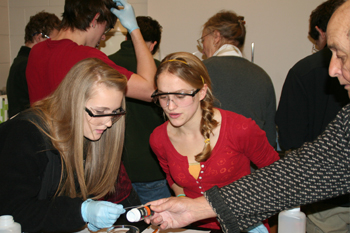Improving Data to Build Trust for Community-Generated Knowledge of Groundwater
![]() Institution: University of Maine
Institution: University of Maine
Sponsor: Maine Water Institute (WRRI)
There is a growing concern that many communities will not have the water resources to support anticipated population growth. Inadequate or degraded drinking water supplies are of a particular interest in rural areas where private wells are neither regulated nor tested frequently. To manage their natural resources wisely, policy makers and citizens can use student-centered projects to increase local participation and understanding.
The Groundwater Education Through Water Evaluation and Testing (Get Wet!) project, designed for rural communities where most homes are served by private wells, works with students in grades 5 to 12 to study drinking water quality. GET WET! organizers and volunteers work with local schools to have students sample their own well water which is then analyzed for several drinking water quality analytes as a class project. Portable laboratory test kits are used to provide reliable and accurate measurements suitable for student use. The results are used to map water quality in the community and also to encourage families to test their drinking water.
 This community-based research offers opportunities to teach students and the community about local natural history and to draw the connection between land use and water quality. To build on these new relationships students are encouraged to present a public summary of their research that includes a discussion of the multiple uses of natural resources. Although the data generated serve useful purposes for education and community engagement, broader acceptance and trust of the results remain elusive. This project will lead to the generation and use of more accurate and reliable water analysis methods in the classroom.
This community-based research offers opportunities to teach students and the community about local natural history and to draw the connection between land use and water quality. To build on these new relationships students are encouraged to present a public summary of their research that includes a discussion of the multiple uses of natural resources. Although the data generated serve useful purposes for education and community engagement, broader acceptance and trust of the results remain elusive. This project will lead to the generation and use of more accurate and reliable water analysis methods in the classroom.
Program Overview & Objectives
This project will evaluate the process used to generate accurate, trust-worthy data that will help to build trust, improve understanding of local groundwater, and improve knowledge of local drinking water quality while producing data that are of value to regulators and researchers. The project objectives are:
- Identify newly developed test methods that may be suitable for student use for the targeted analytes (safety, ease of use, accuracy, cost);
- Validate currently used test methods and newly available methods for analytes having the greatest variability (nitrate, chloride, iron, and hardness);
- Use validation data to assess accuracy and precision of student data for use in decision-making and public health guidance (statistical assessment);
- Adopt new methods into GET WET! as indicated by validation and usability criteria;
- Develop project quality assurance documents;
- Disseminate new information to the GET WET! community and especially educators through various means, including professional publications and presentations at conferences.
Team Leader:
John Peckenham, Senator George J. Mitchell Center
